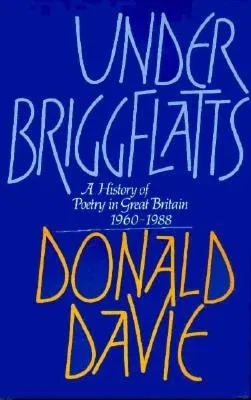Under Briggflatts is a history of the last thirty years of British
poetry with necessary excursions into other areas: criticism,
philosophy, translation, and non-British English poetries. It has grown
naturally out of Donald Davie's immediate involvement with new writing
as a poet, reviewer, teacher, and reader. He has reassessed the writers
who have most engaged his attention, revised his reviews, and
supplemented earlier material with much that is new. Under Briggflatts
provides a narrative that is remarkable in scope and generous in tone.
By combining close readings of specific poems and more general
considerations of style, form, and context, Davie's account is
characteristically elegant, precise, and uncompromising.
Under Briggflatts is organized in three large chapters, one devoted to
each decade. In the 1960s, Davie pays particular attention to the work
of Austin Clarke, Hugh MacDiarmid, Norman McCaig, Keith Douglas, Edwin
Muir, Basil Bunting (the gurus whose prose writings helped catalyze the
traumatic events of 1968), Elaine Feinstein, Sylvia Townsend Warner,
Philip Larkin, Charles Tomlinson, Thomas Kinsella, and Ted Hughes. The
second chapter follows these figures into the new decade and explores
the work of (among others) Thom Gunn, C. H. Sisson, R. S. Thomas, John
Betjeman, and such themes as women's poetry, translation, poetic theory,
and the later impact of T. S. Eliot and of Edward Thomas. Perhaps the
most controversial chapter is the third, in which David--without
abandoning the poets already introduced--assesses Geoffrey Hill, Tony
Harrison, and Seamus Heaney, and looks too at the recovery of Ivor
Gurney's poems, at Ted Hughes as Laureate, the posthumous work of Sylvia
Townsend Warner, the burgeoning Hardy industry, and the critical
writings of Kenneth Cox.

